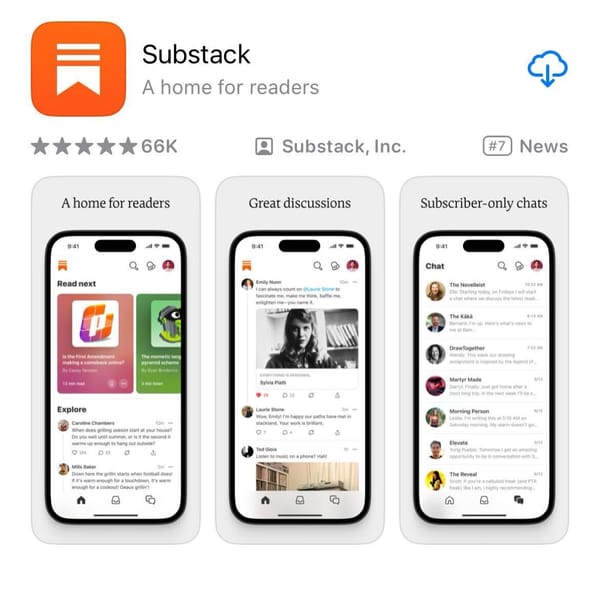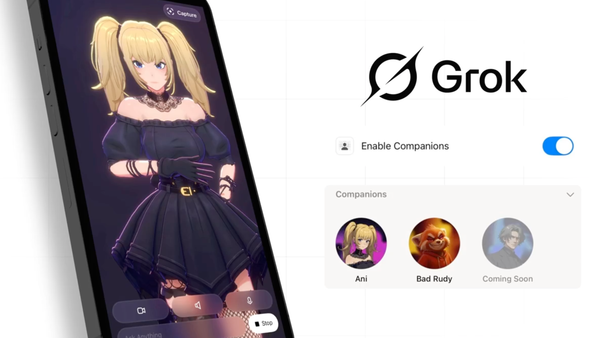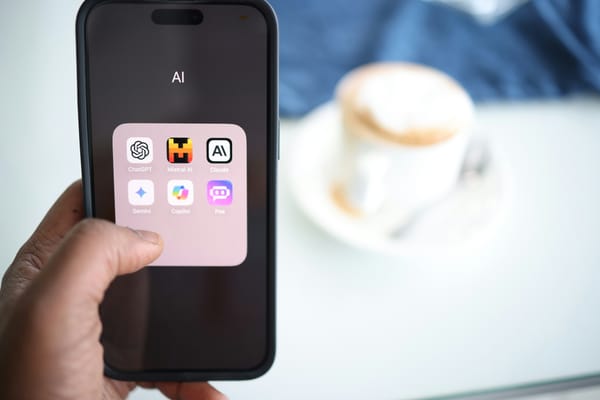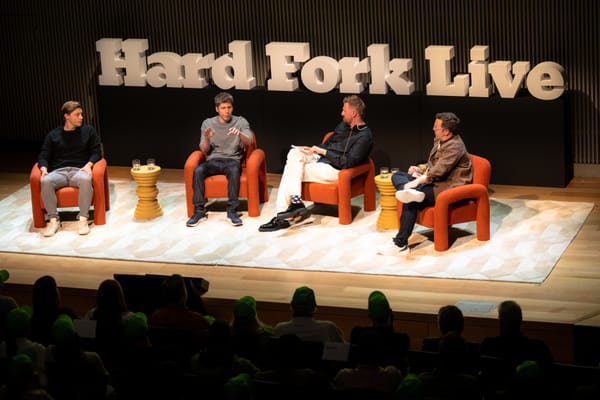Adam Mosseri on the first year of Threads
With more than 175 million monthly users, Meta has its sights set on overtaking Twitter
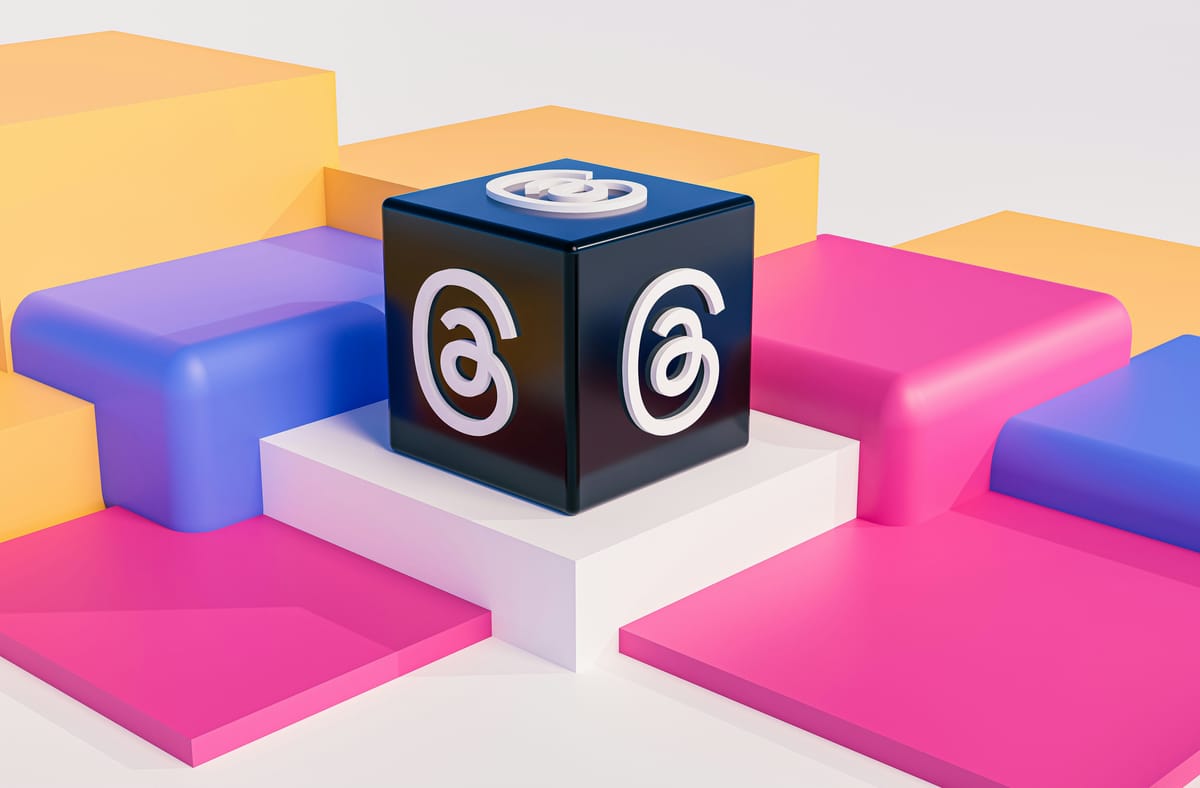
Programming note: With this post, we now go on a short summer break. See you back here July 15.
A year ago this week, Meta introduced Threads to the world.
The text-based social network, which launched as a kind of extension to Instagram, offered little that was not already available elsewhere. But the exodus from Elon Musk’s X had given Meta an opening it had long craved — to seize the opportunity that Twitter once had to host the world’s most compelling real-time public conversations.
The app made an immediate splash, rocketing to 100 million users faster than any app in history. What followed was a predictable but relatively brief decline. And then, a few months later, Threads began growing again. Today, Meta CEO Mark Zuckerberg said that the app has now surpassed 175 million monthly users.
That might be small relative to Instagram, the juggernaut that lent Threads its following graph in order to boost its growth. But it remains extraordinary for an app that won’t even turn 1 until Friday.
Threads has been notable for its rapid pace of iteration, which in just 12 months delivered trending topics, a desktop web app, and a chronological following feed to complement its TikTok-style “for you” feed. It has also sparked controversy over Meta’s decision to hide by default political content from accounts that users don’t follow, a move that has been criticized as hostile to journalism and public discourse.
For months now, I’ve been hoping to catch up with Threads chief Adam Mosseri to discuss the app’s first year and its ongoing evolution. Last month, I got my chance. Over a brisk half hour, Mosseri was candid about what’s working, what’s not, and what Threads plans to work on next.
We talked about the role of journalism on the app, how the Threads team ships so fast, and whether it will ever add Twitter-style lists. (In short: maybe.) And I also pressed Mosseri on my own pet Threads issue: that it’s not funny enough.
This interview has been edited for clarity and length.
Casey Newton: From your perspective, how did Threads’ first year go?
Adam Mosseri: It has been a wild year. Given that we had 100 million registrations in the first four and a half days, expectations went through the roof immediately. Then, the product went through what every new product does, which is a novelty phase where everyone tries it out. After a couple of weeks, the numbers went down in terms of actual daily users. Then all of a sudden, we were a complete failure in everyone's eyes. And then when we started to really grow again, and actually get significantly bigger than even those initial registration numbers — all of a sudden, if we don't beat Twitter by the end of the year, we're a failure again.
What I try to do is, as much as I can, keep the team focused on making the thing better every week.
When Threads launched, lots of folks assumed it would be dead on arrival. I imagine you must feel some degree of satisfaction that a year later, you have a viable new social network on your hands.
I am much more proud of the progress that we've made since launch than I am of the fact that the launch was successful. It's not that the launch isn't something to be proud of. But it is easier to get people to try something than to build something that people want to use on a regular basis. The fact that all the key metrics that I care about most are growing — impressions per day, time per day, daily people, monthly active people, engaged dailies, engaged monthlies — the fact that we've been able to grow it consistently, and in some cases, in an increasing way, is what I'm most proud of. The team has ground out a really, really impressive first year.
What have you learned over the past year about what people want from Threads? And has your thinking evolved at all around what the core use cases for it are?
When we launched, we were very focused on facilitating conversations. Conversations are amazing, and I don't think they're any less viable than I did when we entered. But Threads is actually for a broader use case, which is sharing your ideas. It's a place for commentary about what's happening in the world.
There's been some writing this year that Threads can feel very polished and LinkedIn-like. I've seen other writing that says it can feel very random. I think Max Read called it "the gas leak social network," to describe his tendency to see a lot of people telling random stories about their lives with seemingly no connection to his interests. My question is, what does the Threads feed usually feel like to you? And is there anything in particular you want it to feel like?
My experience is probably odd. I get a lot of content from a few people who were early, and probably also were highly influential within their communities. So there's a couple of accounts within NBA Threads that I see all the time. There's certainly a couple of accounts like yours in the tech world that I see all the time. [Facebook co-founder and Asana CEO] Dustin Moskovitz, who's like an unpaid Threads evangelist.
Maybe your chief evangelist.
But it's evolving. I'd like to see us continue to make progress and go even deeper on key verticals. I would like to gain on NBA Twitter. I would like to see more in the world of European football. I'd like us to get those communities to be more vibrant over time. And we're making progress. But I really want to see more progress on that.
One of the Threads community's favorite subjects is journalism and politics, as you know. You've said that those topics are welcome on Threads, but that you're not going to do anything to promote them to people who haven't sought them out specifically. I'm curious what kind of network you think that approach results in, and how you feel about that a year into taking that approach.
Starting with the latter, I feel very good about the approach. I feel not so good about how I communicated it. I think I communicated it more as news upfront, even with you directly. And I think I really should have been more clear about politics.
To be super clear, politics are on Threads, and they will always be on Threads. We will not get between people and political content that they follow just because it's political. And if you're trying to be a place where people share ideas, it matters a lot to be a place where they share ideas about what's happening in the world right now. And I want to be part of that. I want Threads to be part of that.
Particularly for some of the niche verticals we talked about — it'd be great to go to Threads and see what's happening during the NBA finals, during the Super Bowl, during the Met Gala if you're into fashion, during the Grammys, or the Emmys. So we do need to be a place for news. I just don't think that it's our place to be showing you political takes from people you don't follow. I think that's fundamentally going to create more problems than it solves. And I know we're going to take heat for this. But I still believe that it's the right position.
And when you look at the metrics that matter to you, it seems like you're getting the results that you want.
Could we drive incremental engagement by leaning more into politics? Probably, but probably not nearly as much as people think. One of the issues is that people have these really strong exposure biases, right? So for the longest time, I worked on Facebook, and I worked on News Feed. When I talked to reporters, they were shocked when I would say that the best we can tell is that the percentage of News Feed that is actually news is like 5% percent. And that's because their feed wasn't 5 percent news. It was all news.
But that's the whole point of Facebook, and Instagram, and Twitter, and Threads — you can shape it into what you're interested in. So leaning into politics could maybe drive more engagement. But I think it's a very dicey place to be.
Take a hot issue — the war in Gaza, right now. Do you really want to be showing people content that is a really strong opinion, that is either pro-Israeli or Palestinian, to someone, from an account they did not decide to follow? That is a pretty precarious situation, and a presumptuous thing to do. Could you maybe drive some more attention through that? Probably. Is that really worth it? Worth the risks that come along with it? Worth the anger might create with the mistakes you might make? Hard to say that it's worth that.
You mentioned that you see Threads as a place for people to discuss stuff that's happening in real time. I've noticed recently the fact that the mobile composer now says "what's new?" The desktop version now offers these real time updates, which is amazing for me, because I can now just stare at it all day long.
People love the big desktop!
I think desktop software is underrated in general.
But I'm curious, have you been thinking about these changes for a long time? Or was there some point over the past year where that thought crystallized? Like, “we want people to be here talking about stuff in real time, so let's make stuff for those people specifically.”
We were always more interested in real time than I think our communications reflected. But we definitely have become more interested in real time the longer we've been involved. And we could definitely drive more engagement, more time per person, more impressions per day per person, if we focused less on real time.
But we intentionally focus way more on real time in the ranking for Threads than we do on Instagram. Because we think that if we really want to be the best place to share commentary on what's happening in the world, that we need to do that. And we want to differentiate from Instagram. So yes, we've become more interested in real time over the last year, but we were always more indexed on it on Threads than we were on Instagram.
I've been struck at how quickly Threads has shipped updates over the past year. How did you set the Threads team up to make this happen?
It's been really fun to work on something that is just faster. Part of it is just that you're earlier in the development cycle, so it's more obvious what would be good to build. Part of it is that the team was built around a small nucleus of really passionate people. So we try to pick people who weren't necessarily the most senior, but were the most geared up about trying to build this thing.
And we've tried to design our processes to be really nimble because it was a sprint to start. We wanted to build it in a couple months, and it took a couple more months than we wanted. But still, we built it in less than a year. And that was sort of part of the DNA of the team.
I'll give you an example. I have a weird job — I get to do a lot of amazing things and meet a lot of amazing people. But I'm mostly in meetings, and looking at spreadsheets, presentations, and very, very long documents. My meetings about product are mostly reviews — a team would like a decision, or they would like to give me an update, or they would like a quick steer or a high level of direction on a thing. So there'll be 30 or 60 minutes, there will be a long pre-read, and we'll just talk about that one thing.
The way Threads works is, I said you guys have however long you want — I forget how long it was, maybe was an hour or two — that's dedicated on my calendar every week no matter what. You can have more, but you always have this time. And they never came in with a review on a topic. They had one document with as many topics as they needed. There could be six, there could be nine, there could be two, and we would just bang through them.
And they would be meaty: Let's talk about the core ranking model. Let's talk about the logo and the brand design. Let's talk about fediverse support and the implications on compliance, specifically in the European Union. And then let's talk about our partnership strategy for engaging key partners and key verticals. You might do that in 30 minutes.
That is not how big companies work. That's not how Instagram works. That's still how Threads works.
Are you planning to grow the team much in the next year? Does it feel like this is becoming more of a priority for Meta overall?
We're definitely growing the team. It's still small compared to Instagram. But I'm trying to balance the fact that it's clearly so important that we double down and build on our momentum. And the fact that if we just explode the team, I think we'll lose some of our identity, some of that speed, some of that scrappiness.
Threads has benefited a lot from the fact that it is linked to Instagram. But the two networks still feel mostly separate. How do you think that that relationship might evolve over time?
My hope is that Threads gets more independent over time. It's still deeply integrated with Instagram — you can sign in with the same account, you can automatically follow the same accounts, and we show Threads content in Instagram. But over time, I want it to be more and more independent. We're working on things like Threads-only accounts and data separation. As we iterate on the product, it's gonna differentiate more and more.
There's a strong correlation between people who curate their Threads graph and people will stick around with Threads. It's nice that you can just follow all the same accounts to get started. But if you just do that, it doesn't usually seem to be enough. So I do think the graphs will differentiate more and more over time as well.
You mentioned the fediverse. How has that integration gone so far? And what do you hope for the fediverse in year two?
The fediverse is a long-term bet. It isn't driving a lot of Threads growth.It is proving very difficult just to do the basics, particularly from a compliance and a privacy perspective. The standards we're held to are just different, based on our scale. (That's reasonable, that's not a complaint.) And there's a lot of requirements around the world around data separation, around integrity and safety, around all sorts of things that become exponentially more complicated when you're importing data from other servers, which have different rules, that actually are designed to have different rules.
So everything has become at least three, if not six, or seven times more difficult than we thought. But we're committed to it, and we're making progress. We have some announcements coming soon. We just gotta get the basics out. You’ve got to be able to not only post to the fediverse, but to get your replies in the app. Ideally, you should be able to follow accounts from the fediverse in Threads, not just follow Threads accounts on Mastodon servers or clients. So there's still plenty of work to do. But I do believe the world is going to become more open over time. And we should lean into that. And if it takes time, it takes time.
I often see people on Threads complaining that it doesn't seem like it's built to help them grow large followings, or that they're not reaching their followers. Obviously people say this about every platform, but I do wonder if you have any specific thoughts about how people can grow audiences on Threads or how you're thinking about discovery there in general.
Reach is a perennial problem. It's always gonna be the thing that people focus on, for good reason. It is in our interest to help people's reach grow. If you're creating content that people want to see, if we show it to them, they'll be happy, you'll be happy, and our business will grow. If we don't, we're just leaving value on the table. I feel like people don't always believe me when I say that, but that is very, very much true.
Now with Threads, it's a smaller app, so there's less reach to go around. So you have to recalibrate what your expectations are. But it's also growing much faster than any of these other apps, because it's growing from a smaller base. So it's more of a long-term play.
But my hope is that whether using Threads or Instagram or Twitter or Tik Tok or YouTube, or whatever it is, that reach is not an end, but it is a means to an end. Because ideally, you are clear with yourself about what you're trying to get out of the platform. Are you trying to sell tickets to your gigs because you're a musician? Are you trying to advance a cause because you're an activist? Are you trying to just raise awareness around your art if you're an artist?
My hope is that Threads isn't just about reach, it’s reach for a reason. What are you trying to do? Hopefully, it'll help you do that because either the people you can reach on Threads are disproportionately valuable, or the feedback you get from the community on Threads is disproportionately valuable, or just the consumption of content that you find on Threads is valuable to you. So that's my hope.
That said, we do care about reach, we do try to grow reach. My advice is — and I think what a lot of people don't realize, because a lot of people are coming over from Instagram — they don't realize how important the reply game is. If you're really trying to grow your presence, you should reply much more than you post. And the sum of all your replies is about as valuable as the sum of all the value of all your posts.
When people treat it, like, I'm just going to post and then move on with my day and then post again in a couple days and move on with my day — that's not what it's designed for. If it was for that, we wouldn't have built it as a separate app — we would have built it in Instagram. But we built it so that the reply was as important as the original post — so that you could facilitate, when you're lucky, these great conversations, which by the way helps with discovery.
The Twitter natives that come over tend to understand that. And the Instagram natives less so.
So let's talk about year two. What are your priorities for Threads?
We have to do a lot of things. We have to really improve the ranking of posts in the feed. We need to get better at understanding your interests, and we need to do better at adapting as your interests change. So how quickly can we learn your interests?
If you just look at core measures of ranking quality, things like, if you normalize for position, how many likes does an average recommendation get on [an account that you follow versus one that you don’t]? When you look at Instagram versus Threads, we're just way behind. So we definitely have to make a lot of improvements there.
Another key focus is how do we double down on one of our differentiators, which is just to be a less angry space. We've done some interesting things. Just doing some of the basic content moderation helps. But things like controlling who can reply, controlling who can quote, hidden words — these features, I think, are important beyond their usage. They're about setting a tone, and they're about establishing an identity for the network.
It doesn't mean bad stuff isn't gonna happen. Bad stuff is always going to try to get on any major platform. But I do think the average temperature of Threads content is just lower heat than some other networks. So I think doubling down on that is going to be really important.
We're gonna need to differentiate more. And we'll talk more about that over the coming months. But mostly, our roadmap has been really simple because we are just fast-following basic features — not just that Twitter or X has, but also that any social network has. We need to start to better carve out our own place in the world.
What about making Threads funnier? I would love to put more funny Threads in my newsletter. But even when I scroll for miles I feel like I cannot find a comedian on your app to save my life. Is this your experience? Are you guys talking about this? Can you just pay comedians to post?
I'm gonna have to find a couple of good comedians on Threads. I actually don't have good data on comedy on Threads. Yeah, but comedy is the vertical that I've seen that does the most consistently well across platforms. You look at how comedy performs on Instagram, on Facebook, on TikTok on YouTube. It's like, we all need to laugh sometimes. So if we're not funny, that is concerning.
Other Twitter natives I think would really want me to ask if you're thinking about the idea of lists on Threads.
I'm not opposed to it at all. I'm kind of interested. I mean, we have launched a lot of features — I might regret telling you this — but we have launched a lot of features in this past year that people have asked for a lot, and they have not really moved the trajectory of the app at all in any measurable way.
Like what?
Name a feature that a lot of people requested
The desktop app comes to mind, or real time updating of posts on desktop.
Hasn't moved it very much. A little bit. Real time? No. The following feed? No. Editing posts? No. Chronological search? No. Trending topics? A little. Post search? No.
I joke, but there's this bit that's like, Threads will succeed only if it launches (name your favorite feature). Well, we've carved out time to do these features, because we think it's probably valuable in a way that is hard to measure. Because you're [building goodwill among] the most passionate users, who might drive an outsized amount of value and stick with you for longer in a way that's hard to measure.
I think it's important to have people that want you to succeed. And my guess is, no matter what I say, no matter how much of this we do, people will always be banging on the door about the next thing.
But I do hope we've earned a little bit of credibility. Like, these things you're asking for, we're gonna work through them. We're gonna build them over time.
And it's not because it matters for the core growth of the network. The effect of all those things has been minimal compared to improving ranking, improving friending, improving Instagram integrations, improving notifications, improving performance, improving reliability. That might not be sexy. But it's what matters in terms of moving the needle. But you also need to carve out room for what I call these "finally features," too. Finally, why did you not have multiple tabs on desktop? That's crazy! Finally, why didn't you have an edit button? That's crazy! So we have built them and we will continue to build them. And lists are going to be evaluated as one of those.
So how would you sum up year one?
I'm really proud of the work we've done. And I'm also really real about how much more work there is to do. But I want to build the best platform for sharing ideas online. That means getting bigger than Twitter or X. That will take some time, but I will consider it a failure if we don't get there.

Governing
- The Supreme Court put laws that would make content moderation illegal in Florida and Texas on hold while they’re reexamined by lower courts. The court seems to have affirmed platforms' First Amendment right to moderate content as they see fit, for now. (Kaia Hubbard and Melissa Quinn / CBS)
- The Supreme Court will hear a challenge next term to the Texas law requiring that porn sites verify users' ages. (Andrew Chung / Reuters)
- A federal judge blocked a Mississippi law that would require age verification for all users to use social media sites and for teens to get parental consent. (Lauren Feiner / The Verge)
- The Supreme Court decision overturning Chevron (which meant courts deferred to federal agencies when there were disputes over how to interpret laws passed by Congress) will have massive implications for the tech industry, including broadband, H1B visas, and the right to repair. (The Verge)
- The California state Senate passed a law aimed at stabilizing the news industry with tax dollars from big tech companies. ( Laurel Rosenhall / Los Angeles Times)
- Meta said it would lift its ban on the Arabic word "shaheed," or martyr, after the Oversight Board said the ban resulted in too much censorship of political speech. (Reuters)
- The Meta Oversight Board’s future has been in limbo as the tech giant appears increasingly hesitant to fund its work. It's now hoping to set up a second business moderating appeals of European users whose accounts get banned. (Naomi Nix / Washington Post)
- The EU Competition Commissioner said Apple’s decision to not launch its AI features in the EU (due to EU interoperability requirements) is a “stunning declaration” of anticompetitive behavior. I think it's a declaration that they have no idea what EU regulators will consider to be in compliance with the Digital Markets Act. Speaking of which ... (Eliza Gkritsi / Euractiv)
- EU regulators say Meta can't monetize through personalized advertising or subscriptions, demanding that the company come up with a new business model. (Foo Yun Chee / Reuters)
- The European Commission is preparing to launch an antitrust investigation into Microsoft’s partnership with OpenAI. (Javier Espinoza and Tim Bradshaw / Financial Times)
- Microsoft informed state agencies in Texas that Russian hackers gained access to their email correspondence in January. (Jake Bleiberg / Bloomberg)
- Google said its greenhouse gas emissions rose 48 percent in the past five years as it invests in building artificial intelligence services. The company's pledge to hit zero emissions by 2030 is now in doubt. (Camilla Hodgson and Stephen Morris / Financial Times)
- Google said it would require advertisers to disclose when they use manipulated media that depicts real people and events in election ads. (Reuters)
- Some YouTube employees say the company has inconsistently enforced its moderation guidelines related to the war in Gaza. (Paresh Dave / WIRED)
- The US government has an extremely heavy burden to justify the TikTok ban, as it could violate the First Amendment, according to an amicus brief filed by the Electronic Frontier Foundation. (Electronic Frontier Foundation)
- Quora's chatbot platform Poe lets users download paywalled articles from major publications like the New York Times and The Atlantic, raising copyright concerns. (Tim Marchman / Wired)
- ChatGPT and Copilot reiterated false information about last week’s presidential debate, seemingly drawing on conservative misinformation that was circulating online. (Ben Goggin / NBC)
- Microsoft's CEO of AI, Mustafa Suleyman, says all content shared on the web is "freeware" and can be used to train AI unless explicitly stated otherwise. (Sean Endicott / Windows Central)
- Dan Hendrycks, one of the “most influential up-and-coming figures in the world of AI safety and policy,” talked to Bloomberg about what it’s like advising Elon Musk on AI safety rules. (Shirin Ghaffary / Bloomberg)
- Nvidia will face antitrust charges by French regulators for alleged anti-competitive practices. (Foo Yun Chee / Reuters)
- Italy is asking Google to pay $1.07 billion in unpaid taxes and penalties. (Reuters)

Industry
- Snapchat+ subscribers can now send super-short snaps and design custom houses on the Snap Map. (Aisha Malik / TechCrunch)
- Character.AI has discussed research partnerships with Google and Meta as competition in the chatbot space intensifies. (Kalley Huang / The Information)
- One of the co-authors of the AI Transformer paper warns against the dangers of corporate AI. His alternative: user-owned AI. (Steven Levy / Wired)
- Stability AI’s disastrous launch of Stable Diffusion 3 has prompted some users and businesses to band together to build their own models. (Emanuel Maiberg / 404 Media)
- YouTube now lets users request takedowns of AI-generated content that simulates their face or voice. (Sarah Perez / TechCrunch)
- Meta changed its labels on photos from "Made with AI" to "AI info" after receiving complaints from users. (Ivan Mehta / TechCrunch)
- Apple launched the Vision Pro in China, Hong Kong, Japan, and Singapore. Sales in the US have allegedly slowed in the five months since the device launched. (Tim Hardwick / MacRumors)
- Amazon is planning to use the same controversial loophole as Temu and Shein to import items from China sold on its new discount section without paying duties. (Jing Yang and Theo Wayt / The Information)

Those good posts
For more good posts every day, follow Casey’s Instagram stories.
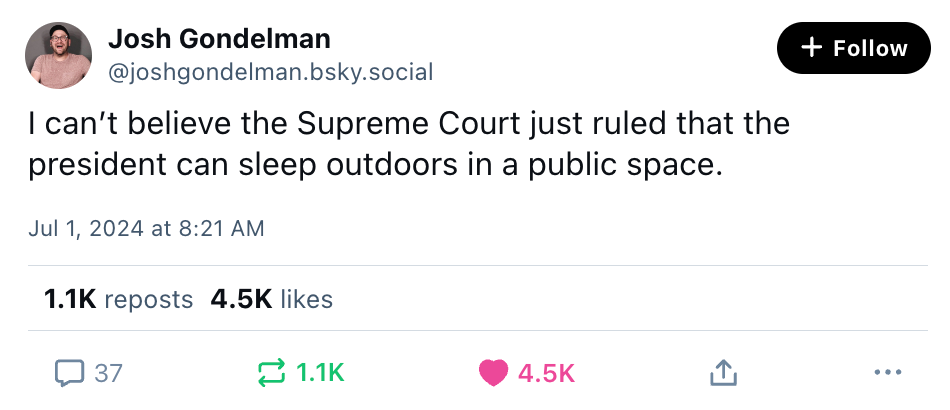
(Link)
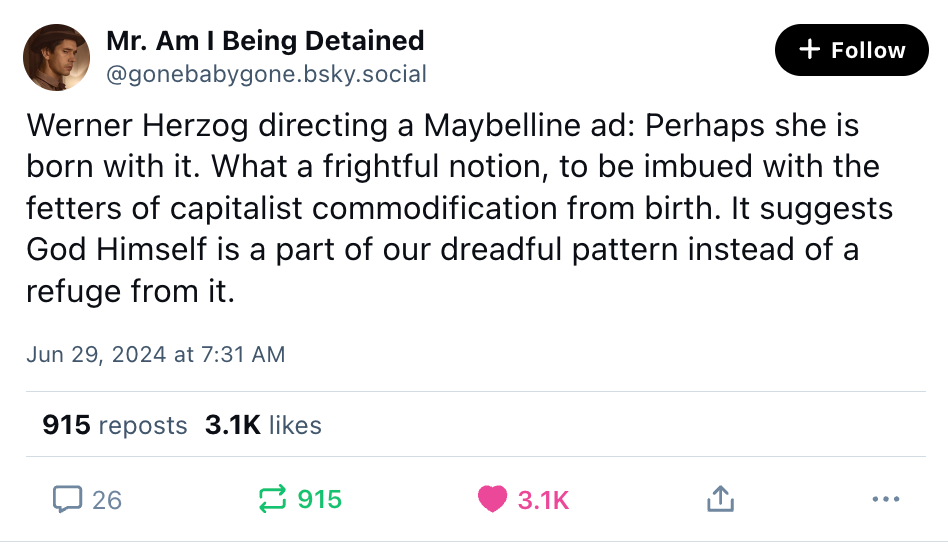
(Link)
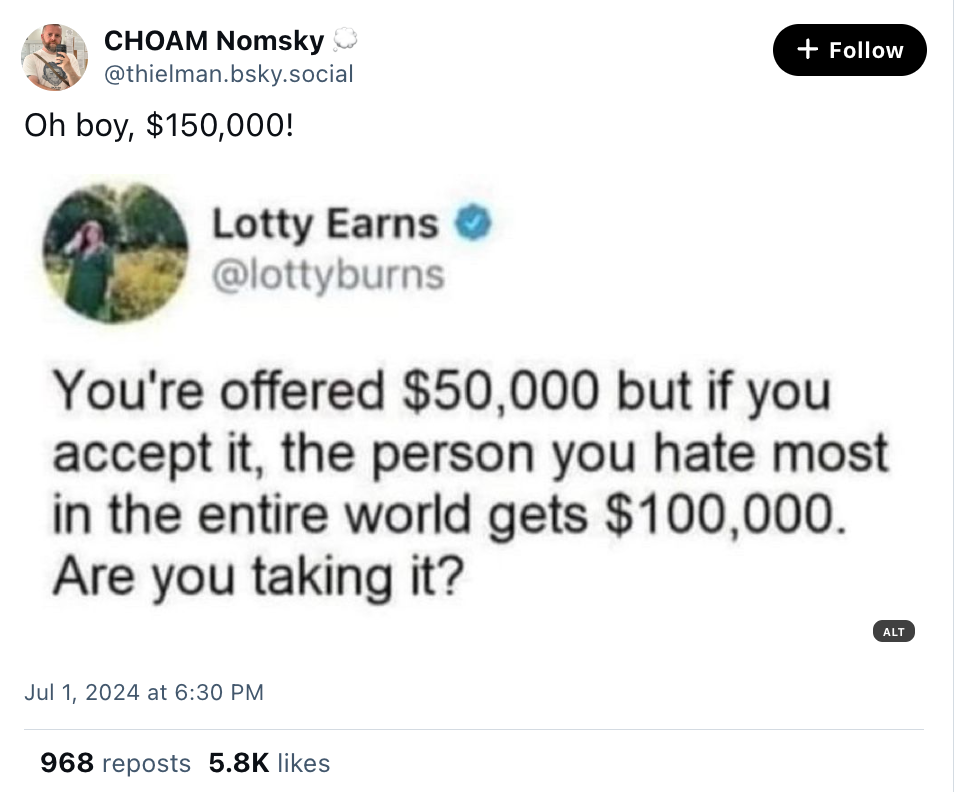
(Link)

Talk to us
Send us tips, comments, questions, and funny Threads: casey@platformer.news and zoe@platformer.news.


